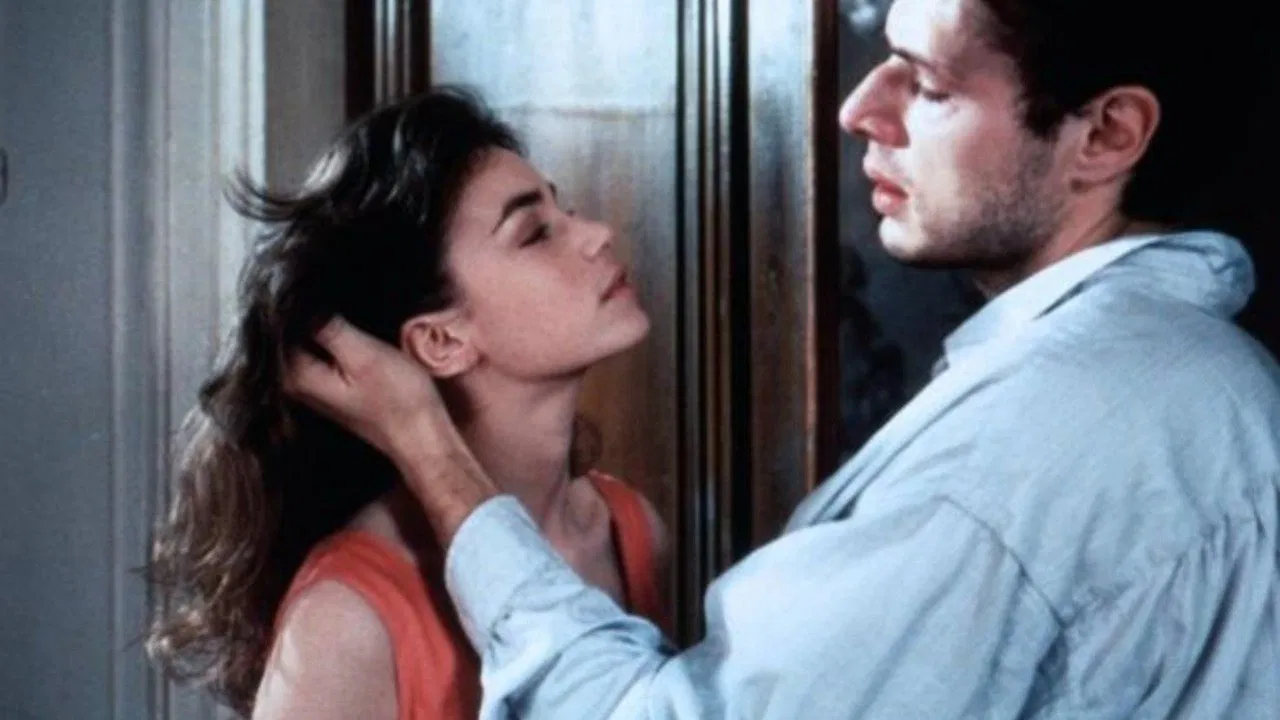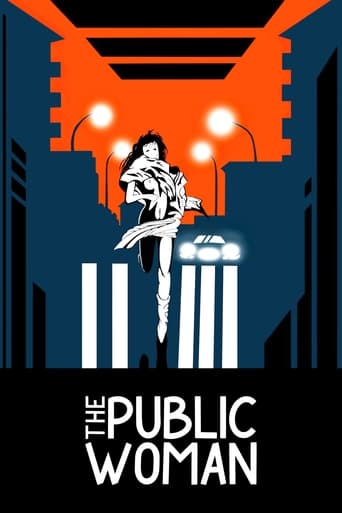

Fantastic!
... View MoreThe performances transcend the film's tropes, grounding it in characters that feel more complete than this subgenre often produces.
... View MoreThis is ultimately a movie about the very bad things that can happen when we don't address our unease, when we just try to brush it off, whether that's to fit in or to preserve our self-image.
... View MoreIf you like to be scared, if you like to laugh, and if you like to learn a thing or two at the movies, this absolutely cannot be missed.
... View More"La femme publique" does not allow traces of subtlety. In fact, in fantasy or in the mixture between these two poles, everything is said or shown in excesses.To the unsuspecting, it is the warning: the work of the Polish director Andrzej Żuławski is neither rest nor invitation to the contemplative gaze, nor does it want to be analytical. It allows, however, many reflections and moments of pure poetry, but its main characteristic is the disturbing, provocative, rebellious and critical figure about life and consequently about man."La femme publique" was made in 1984 with inspiration from the novel "Demons" by Dostoevsky. Scenes of this same healthy play used in a film that is being made within the film itself or what would be the main story "La femme ..." this use of metalanguage, which often complicates the understanding of the work, yields, in Counterpart, a valuable game that even equates the audience with the protagonist of the story, the dizzying Ethel (Valérie Kaprisky).She equates in the sense that Ethel is a young aspiring actress who can not differentiate acting and reality, to the point of assuming the figure of a dead woman whose murderer is the abusive and displaced director Lucas Kesling (Francis Huster), add to this plot the A figure of Milan (Lambert Wilson), a Czech immigrant who is manipulated by the filmmaker (Lucas) to commit a political assassination. Among these three characters that form a love triangle that is never realized or wanted to be performed, we accompany the fears, insanities, challenges and impulses as archetypes of a fictional world mirrored to the real.At various moments in the film, we feel as if we are as lost as Ethel, and as his character, there is no one who can give us hands, on the contrary, whenever someone arises we are attacked either verbally or physically, which establishes A very crazy game that makes us embarrassed, because when this game is fictional (that is being shot during the main movie) such aggressions are even well received, but when they reveal themselves in the reality of the lives of those actors, human beings, it is an aggression Even though there is a strong backing that we are watching a performance within the other, but again, as it is mirrored in real life, it is a madness and aggression common to human life.Whether it's a recording set, a movie day, or the end of the movie, where actors like a theater revere the public's applause. In all these moments that mix reality and fiction, the palette of tones used in "La femme publique" does not allow traces of subtlety. In fact, in fantasy or in the mixture between these two poles, everything is said or shown in excesses. Because the traits are so gross, the moments of failure and the uncertainty of which world we are, soften this drama. It is interesting to note the theatrical references that accompany the director Andrzej Żuławsk, not only of theatrical authors, but in reference to theatricals like Brecht, with his political theater with ruptures and fragmentation of the scenes, besides the "I" narrator where the figure of the actor is Sometimes the intermediary of the author's ideas. Another theatrical reference is by Antonin Artaud is his theater of cruelty, where the actors look for in real situations and emotions to bring them and to revive them in the stage, like the young actress Ethel of the film, however, that is lost when mixing Reality and fiction.Although relatively narrow, Zuławski weaves his own tale of political violence with Dostoyevsky. Kesling explains that he wants to adapt the novel because it is "a prophetic tale about those who try to change the world through violence," and strangely it becomes the incarnation of Stavrogin and Verkhovensky. Zuławski selects key scenes from "Demons" to include as the film within a movie and most of them have to do with political content. The scene at one of Verkhovensky's meetings is brilliantly filmed as a sweaty game on an indoor tennis court, where it is stated that "murder, blackmail, extortion, bombs" will be added to his agenda, and a list of people to be killed must Be drafted immediately.The camera in the films of Żuławski is chained in scenes, advancing in the arrows and actively seeking the actors, most scenes of "Femme Publique" is struck by low and daring angles that make Kaprisky a species of totemic goddess or a lost soul in means To vertiginous and cavernous European buildings, spiral staircases and dilapidated columns. But this is also his most sumptuous film in terms of lighting, courtesy of the celebrated director of photography Sacha Vierny.No longer the acting of the actors is the height of the film, but Valérie Kaprisky with its Ethel dominate the scene. If at the beginning of the film we have the young actress with lots of magazines of famous actors, the same happens with the consecration, even if fantastical of Ethel, stamping another pile of magazines, becoming the actress and woman publishes. Ethel's eroticism, through her body, her dance and her beauty, which is eternalized in this film and will surely be in the public's memory for a long time.
... View MoreStruggling actress Ethel (Valérie Kaprisky) does private nude modeling sessions for photographer André. Famed director Lucas Kessling wants her as lead in his adaptation of Dostoyevsky's "The Possessed". They get into a relationship and a surreal film production. He recruits dishwasher Milan Mliska (Lambert Wilson) to be her possessive disturbed husband as reality and fiction blend into this unreal journey.This is an unreal film. Kaprisky is sexually unencumbered and magnetically charismatic. She does plenty of strut-walking. She powerfully fills the screen. Lucas Kessling is an intriguing mercurial character. The surrealism is interesting at first but it gets maddeningly unreal. The wild swings and crazy 180 turns frustrated me. There is one scene in particular where Ethel faints and completely recover immediately with everybody ignoring what happened. It's a cheap kind of surrealism. It's almost student film level. Other parts like her nude photography is unforgettable. At some point, the weird surreal twists and turns bored me by their unhinged-nature.
... View MoreThe 5th feature from the late Polish director Andrzej Zulawski (1940-2016), THE PUBLIC WOMAN is a French production, starring Valérie Kaprisky as a young girl Ethel, who has been chosen by the film director Lucas Kessling (Huster), a Czech immigrant, to star in his movie adaptation of Dostoyevsky's novel "THE POSSESSED, aka. DEMONS", which is shot in Paris.Ethel has no acting experience, it is her raw sexual appeal turns on the egoistic Lucas, he hooks up with her but finds her lacking in dramatisation and articulation of her character during the filmmaking, which itself is a constant jag of kerfuffle and chaos. Zulawski engages a freewheeling style to the angles of frame, which is navigated with ingenious dexterity by the legendary cinematographer Sacha Vierny, and he proffers us a close look of the process of making film in a crammed set, with slickly choreographed mobility and a hammy cast aggravated by heavy cosmetics.After mounting a humiliating remonstration on Ethel for her incompetence, Lucas fires her and the narrative shifts from the sadomasochistic relationship between them to a new chapter, when Elena (Delor), a Czech actress, one of Lucas' mistress, goes missing, Ethel implausibly takes the imposture as Elena and plunges herself into a steamy relationship with Elena's husband Milan Mliska (Wilson), a frail, self-abusing (glass-chewing) young man who later will be involved into a political assassin of a Lithuanian cardinal and is hunted; thereafter, Lucas decides to re-hire Ethel for the role and she is sandwiched between him and Milan, both are driven mad by petit jealousy until one of them is forever out of the picture, and Ethel will finally triumph with a tour-de-force to show that an "actress" is born.Being an art-house endeavour, nudity (notoriously for Ethel's two naked dancing sequences) and explicit sex scenes are indispensable here, which even leave a bitter taste of gratuitous exploitation; and we can clearly see the dummy in the sole car chasing set piece, a telling proof that commercial cinema is not such an easy piece of pie to emulate. But Kaprisky emotes beautifully from the taxing requirements her role entails, both physically and mentally; a blond Huster, with a haunting resemblance of a less delicate Farley Granger, is unwaveringly committed, but sometimes he is overbearingly tiresome; last but not the least, a young Wilson establishes himself in his early career that he can be madly charming and charmingly mad simultaneously.Concocted with a little political allusion, a fairly firm buttress of female-empowerment under the patriarchal repression, an excessive amount of exotica and a largely madcap storyline, THE PUBLIC WOMAN does not give full justice to Zulawski's talent, although it will stay with you for its convivial self-awareness of its subject as the cast takes a bow in the last scene, it is a theatrical farce, but done with a certain degree of flourish.
... View MoreI am prompted to write this user review by the ghastly unhelpful two previous reviews here, which do not do the movie a single jot of justice. One wonders why they have bothered to comment, when it seems they have not even seen the movie in a language they can understand.Naked dancing will of course attract some (in this case, well-deserved) attention, but my impression of the movie was that the whole "public woman" theme is actually the least explored of multiple other themes in the movie. The movie is about movie-making, and in turn about the difference between cinema and reality, meaningfully underscoring its point by being excessively melodramatic in its movie-within-the-movie bits (incl. the opening sequence). It is not a movie for obtuse audiences. The movie being made inside the movie is an adaptation of Dostoyevski's "The Possessed", which I am certain it will help to have read, although it is really being chewed up to an over-the-top degree here.The Czech guy (played by Lambert Wilson of Matrix fame) is a snitch who has reported his dissident friends to the communist authorities, and subsequently become an assassin for them - one they intend to use as a "lone nut" scapegoat in getting rid of a Lithuanian cardinal who's getting too popular. This being Zulawski's account of his own role as a rising star in communist Poland, and what he imagines the authorities want to do to him (which is why he transferred his career to France).This is a complex and unique movie which will stimulate and challenge intelligent viewers. The rest will simply be confused.9 out of 10.
... View More